From the Chicago Reader (October 1, 2000). — J.R.
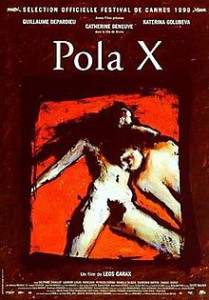
I haven’t read Herman Melville’s Pierre, or the Ambiguities, but it’s reportedly director Leos Carax’s favorite novel. What there is of a plot to this 1999 modern-dress adaptation, which Carax wrote with Lauren Sedofsky and Jean-Pol Fargeau, concerns a wealthy author (Guillaume Depardieu, son of Gerard) living in Normandy in semi-incestuous contentment with his mother (Catherine Deneuve). Upon encountering a soulful eastern European war refugee (Katerina Golubeva) who claims to be his half sister, he runs out on his wealthy fiancee (Delphine Chuillot) and retreats to a funky part of Paris to write another novel. There’s clearly some sort of self-portraiture going on here. A 19th-century romantic inhabiting a universe as mythological as Jean Cocteau’s, Carax (Boy Meets Girl, Bad Blood, The Lovers on the Bridge) has a wonderful cinematic eye and a personal feeling for editing rhythms, and his sense of overripeness and excess virtually defines him. He’s as self-indulgent as they come, and we’d all be much the poorer if he weren’t. Characteristic of his private sense of poetics is this film’s dedication, near the end of the closing credits, “to my three sisters” — it appears on-screen for less than a second. Read more
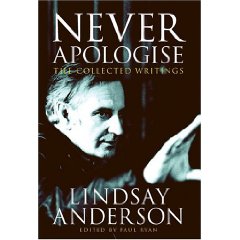
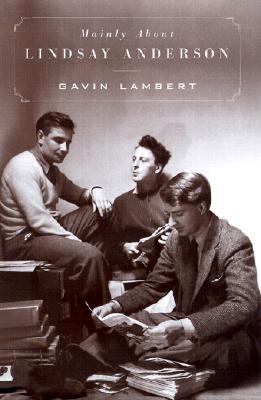
NEVER APOLOGISE: THE COLLECTED WRITINGS by Lindsay Anderson, edited by Paul Ryan, London: Plexus, 2004, 612 pp.
MOSTLY ABOUT LINDSAY ANDERSON by Gavin Lambert, New York, Alfred A. Knopf, 2000, 384 pp.
I’ve never considered myself a particular fan of Lindsay Anderson, either as a filmmaker or as a film critic, so what am I doing recommending these two books? I wound up reading the Lambert memoir, which I now regard as perhaps Lambert’s most affecting book, for what it had to say about Nicholas Ray, but what it has to say about Anderson turned out to be pretty moving and compelling as well. And then running across a copy of Anderson’s collected film criticism, quite by chance, in a New York Barnes & Noble outlet last month eventually encouraged me to order a copy from Amazon U.K., which turned up today. Judging from the sampling that I’ve done so far, I don’t expect to agree with very much in it, but this is beside the point: as a mammoth film chronicle covering several decades, it seems comparable in importance, simply as a historical artifact, to the more recent Farber on Film: The Complete Film Writings of Manny Farber, with plenty of flinty iconoclasm in its own right, as its title suggests. Read more
From the Chicago Reader (February 2, 2001). — J.R.
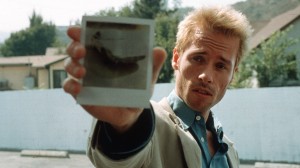
With its classically seedy southern California setting, this second feature by Christopher Nolan is more memorable than his first, Following (1998). Nonetheless, it exemplifies what the English mean when they call something too clever by half. It’s a fascinating and gripping but also rather heartless and mean-spirited tale, much of it told backward, about an insurance investigator (Guy Pearce) with short-term amnesia trying to avenge the rape and murder of his wife. Severely hampered by his periodically forgetting everything that’s happened since this tragedy, he tries to compensate by shooting Polaroids and tattooing his body with various reminders and instructions. More a puzzle than a meaningful story, it reminds me of how Edmund Wilson compared reading a mystery to eagerly unpacking a box of excelsior, only to find a few rusty nails at the bottom. With Carrie-Anne Moss, Joe Pantoliano, and Stephen Tobolowsky. R, 113 min. (JR)
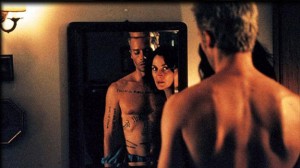 Read more
Read more





